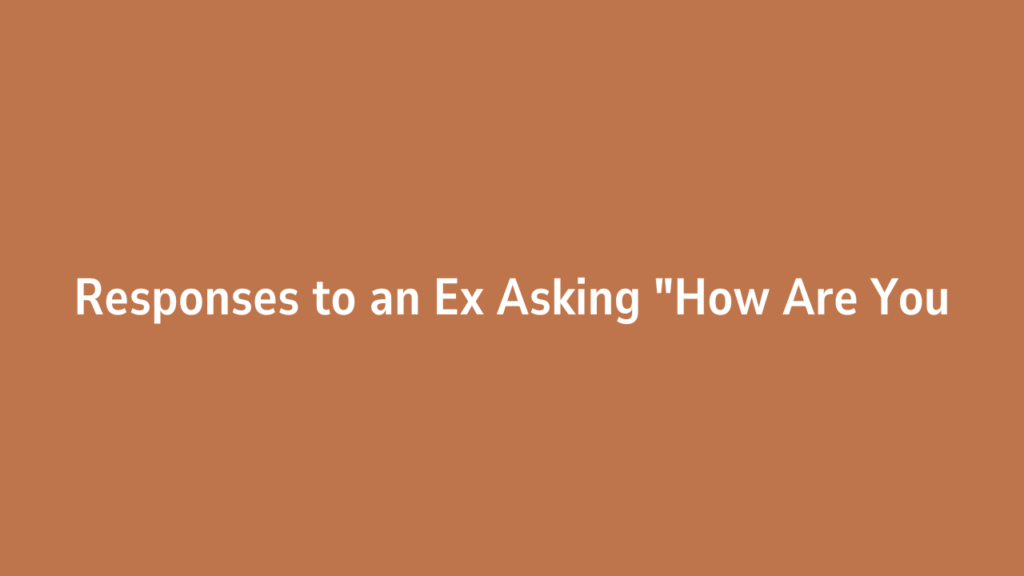It’s common for ex-partners to reach out after a breakup, sometimes with a simple “How are you?” While this might seem like a casual, polite question, it can stir up a lot of emotions. What should you say? How should you respond? This article will explore different ways to respond to an ex asking how you’re doing, depending on your situation, emotions, and what you want from the conversation.
Why Does Your Ex Ask “How Are You?”
Before diving into responses, let’s understand why your ex might be asking this question. There can be several reasons:
- Genuine Concern: They may still care about you and want to know how you’re doing post-breakup.
- Nostalgia: Your ex could be reflecting on the past and might miss the connection you shared.
- Curiosity: Sometimes, exes are just curious about how you’re adjusting to life without them.
- Testing the Waters: Your ex could be trying to gauge your emotional state or see if you’re open to talking or reconnecting.
- Politeness: Sometimes, it’s just a polite, neutral question with no deeper meaning.
Understanding their motive can help you decide how to respond.
Should You Respond to an Ex?
First, consider whether you want to respond at all. There’s no obligation to reply to your ex, especially if you’re still healing from the breakup or if you don’t feel comfortable engaging.
Here are a few things to think about before responding:
- Your Emotional State: Are you in a good place emotionally? Are you over the breakup? If not, it might be best to avoid any contact.
- Your Current Relationship Status: Are you seeing someone new? If you are, your response might impact your current relationship.
- Your Boundaries: Setting boundaries with an ex can help protect your peace. If you feel responding will open old wounds, it’s okay to not reply.
- The Nature of the Breakup: Was it amicable or messy? If the breakup was painful, responding may cause unnecessary stress.
If you feel responding is the right choice, let’s go over some ways you can reply to “How are you?”
Types of Responses to “How Are You?”
Your response can range from casual and friendly to distant or even assertive. Here are some options to consider:
1. Casual and Neutral Responses
If you’re looking for a simple, neutral reply that doesn’t open the door to more in-depth conversation, these responses can work well.
- “I’m doing well, thanks for asking!”
- “I’m good, just keeping busy.”
- “Things are going okay on my end.”
- “I’ve been alright, how about you?” (this puts the focus back on them)
These types of answers acknowledge the question but don’t encourage further emotional conversation.
2. Honest and Vulnerable Responses
If you’re in a place where you feel comfortable being open about your emotions, you may choose to be more vulnerable.
- “It’s been tough, but I’m getting through it.”
- “I’ve had better days, but I’m doing okay overall.”
- “I’m healing, but it’s still a process.”
These responses offer a bit more insight into how you’re feeling but still keep things fairly light. They can help maintain honesty without overwhelming your ex.
3. Polite but Distant Responses
If you’re not interested in rekindling any conversation or emotional connection, you might prefer keeping things polite but distant.
- “I’m doing fine, hope you’re well.”
- “I’ve been alright, hope everything’s good with you.”
- “I’m doing okay, thanks for checking in.”
These replies keep the tone polite but do not invite any deeper emotional exchange. You can show that you’re civil, without encouraging further interaction.
4. Humorous or Lighthearted Responses
Sometimes, using humor can ease the tension and make the conversation feel less serious. It can also signal that you’re not as affected by the breakup.
- “Surviving, as we all are!”
- “Better now that you asked!”
- “Living the dream… or at least trying to!”
These responses can help you maintain a lighthearted tone, making it clear that you’re not emotionally invested in the conversation.
5. Direct and Clear Responses
If you want to set boundaries or make it clear that you’re not interested in continuing the conversation, you can give a more direct answer.
- “I’m doing well, but I think it’s best if we don’t keep in touch.”
- “I’m good, but I think it’s time we both move on.”
- “Thanks for asking, but I’m not really looking to talk right now.”
These responses are straightforward and let your ex know where you stand.
When Should You Respond to Your Ex?
Choosing the right moment to respond can be just as important as how you respond. Here are some situations when you might want to take extra care with your reply:
1. After a Long Time of No Contact
If it’s been a long time since you’ve heard from your ex, you may feel unsure about responding. In this case, take a moment to reflect on why they’ve reached out after such a long silence.
- What’s changed? Have they been reaching out to others too? Or are they just reaching out to you because of personal reasons?
- Are you still emotionally ready to engage? If you’ve been healing, it might not be the best time to respond.
- Is the conversation leading to something more? Pay attention to the tone of their messages. If they’re hinting at reconnecting or reopening the relationship, you might need to be more cautious.
2. When You’re In a New Relationship
If you’ve started dating someone new, your current partner might not be comfortable with you engaging with your ex. Before responding, consider the dynamics of your current relationship.
- Is your new partner comfortable with your ex reaching out?
- Will responding to your ex cause issues in your relationship?
- Are you doing it for closure or out of habit?
3. When You Want Closure
Sometimes, an ex’s simple question can open the door for some closure. If you’re still processing the breakup, it might help to respond and have a brief conversation to clear the air.
- Can you move on after this conversation?
- Is there anything you feel like you need to say to your ex?
If responding helps you find peace, then go ahead. But if it feels like reopening old wounds, it’s okay to ignore or delay a response.
Table: When to Respond vs. When Not to Respond
| Situation | Response Type | Why It Works |
|---|---|---|
| You’ve healed and are at peace | Friendly or neutral response | Maintains civility and closure without reopening old wounds. |
| You’re emotionally vulnerable | Honest and open response | Allows you to express feelings while keeping the conversation light. |
| You want to move on | Polite and distant response | Keeps boundaries clear, signaling that you prefer not to engage further. |
| You’re in a new relationship | Polite and clear response | Shows respect for your current partner and relationship. |
| You need closure | Direct response or brief conversation | Helps you process the breakup and move forward. |
Key Takeaways
- Your Response Should Reflect Your Feelings: It’s okay to be honest or distant based on how you feel.
- Boundaries Matter: Don’t be afraid to set clear boundaries if you’re not ready to talk or engage further.
- Keep It Short and Simple: If you’re unsure about continuing the conversation, keep your responses short to avoid unnecessary emotional investment.
- Pay Attention to Intent: Be aware of your ex’s intentions behind the question. Are they genuinely curious, or are they trying to reopen a conversation about the relationship?
Ultimately, responding to your ex asking “How are you?” is about deciding what feels right for you. Whether you choose to be friendly, distant, or straightforward, the key is to be true to yourself and your needs.



